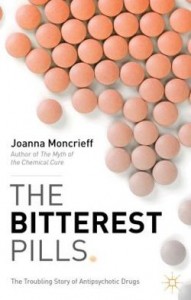Dr. Joanna Moncrieff is a UK psychiatrist and a founding member of the Critical Psychiatry Network. In 2009 she wrote The Myth of the Chemical Cure: A Critique of Psychiatric Drug Treatment.
Her latest book, The Bitterest Pills, was published earlier this year, and is about neuroleptic drugs (the so-called anti-psychotics). You can get an idea of the tenor and scope of the work from the table of contents:
- Curse or Cure: What Are Antipsychotics?
- Chlorpromazine: The First Wonder Drug
- Magic Bullets: The Development of Ideas on Drug Action
- Building a House of Cards: The Dopamine Theory of Schizophrenia and Drug Action
- The Phoenix Rises: From Tardive Dyskinesia to the Introduction of ‘Atypicals’
- Looking Where the Light Is: Randomised Controlled Trials of Antipsychotics
- The Patient’s Dilemma: Other Evidence on the Effects of Antipsychotics
- Chemical Cosh: Antipsychotics and Chemical Restraint
- Old and New Drug-induced Problems
- The First Tentacles: The ‘Early Intervention in Psychosis’ Movement
- The Antipsychotic Epidemic: Prescribing in the Twenty-first Century
- All is not as it Seems
There are 39 pages of references at the back.
Here are some quotes:
“It is necessary to point out, however, that despite the claims of much official information, current evidence does not allow us to conclude that schizophrenia is a brain disease in the simple sense in which we usually understand the term ‘disease’. No biological factor, whether it be a genetic, biochemical or anatomical deviation, has been found that is consistently and specifically related to schizophrenia, despite more than half a century of recognizably modern research efforts. Moreover, what was thought to be one of the most reliable indications that schizophrenia arises from a defective brain, namely the finding that people with the diagnosis have smaller brains and larger brain cavities than people without, turns out, as we shall see in Chapter 10, to be at least partially a consequence of antipsychotic drug treatment.” (p 16)
“Descriptions of the neurological and physiological effects induced by antipsychotics and other psychiatric drugs such as antidepressants, disappeared from the literature …Henceforth they were referred to, if at all, only as ‘side effects’, which were regarded as an incidental nuisance, rather than an intrinsic part of the a drug’s action.” (p 51)
“In view of the considerable evidence that the only dopamine abnormalities in people with schizophrenia are caused by antipsychotic treatment, it is hard to think what evidence could convince the promoters of the dopamine theory of schizophrenia or psychosis that the theory is mistaken.” (p 74)
“Prominent psychiatrists, including David Cunningham Owens (whose research had been used to argue that tardive dyskinesia was part of schizophrenia, but who, in later years, has become more critical of drug treatments), have started to suggest that the story of atypical antipsychotics as a group of compounds with unique therapeutic properties is a myth, largely constructed by the pharmaceutical industry, and swallowed hook, line and sinker by the psychiatric profession…” (p 90)
“People commenting on olanzapine described an altered state consisting of profound sedation accompanied by emotional flattening and indifference, in association with a markedly increased appetite for food.” (p 121)
“The use of drugs to control behaviour started to be discussed more frequently in psychiatric journals from the 1970s onwards, but articles adopted various strategies in order to emphasis the therapeutic aspects of emergency drug treatment and play down its coercive function.” (p 139)
“It seems extraordinary in the twenty-first century that people should be forced to take drugs which profoundly alter their bodily functions, their emotional life, their behaviours and personality, and that the institutions that instigate and enforce this ‘treatment’ have no interest in the range of effects the drugs produce and how they make people feel.” (p 151)
“An almost religious commitment to the disease-centred view of psychiatric drug action has created a blind spot to the serious physical consequences that long-term ingestion of toxic substances is likely to produce, and drug companies are still able to present antipsychotic drugs as innocuous and restorative agents that work by balancing the brain’s ‘natural chemicals’… (p 213)
This excellent book is for anyone who has a serious interest in the topic: survivors, caregivers, writers, students, etc… It’s a book to read and to keep close for reference and research.
Disclosure: I have no financial interest in this work or in any book that I promote on this website.
